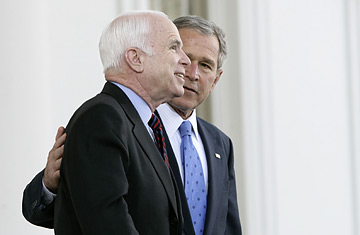
Republican U.S. presidential nominee Senator John McCain is greeted by U.S. President George W Bush at the Rose Garden at the White House on March 5, 2008.
(3 of 3)
Compared with what went before, says Weaver, relations between McCain and Bush in Bush's second term have been something like the Era of Good Feeling. True, McCain was among the first lawmakers of any party to take on Pentagon chief Donald Rumsfeld directly--and did so with such force and frequency that "it began to really annoy the President," says a former top aide to Bush. And for a brief moment in the fall of 2006, it seemed that McCain's truce with Bush would fall apart over the President's support for interrogation techniques that McCain, who is something of an expert on the subject, considered torture. But through all that, says a McCain associate, "it never got to DEFCON 1." In April 2007, at an early gathering of GOP candidates before the party faithful in Des Moines, Iowa, McCain ladled praise on Bush. "I support him," he gushed, "and I believe in him."
But always, there were limits. The White House quietly pushed two other Republicans for the GOP nomination in 2005--first Bill Frist and then George Allen, both of whom flamed out. Even as some of his own top campaign advisers, including McKinnon, Nelson and Steve Schmidt, went to work for McCain, Bush doubted McCain's chances of winning the GOP nomination. "The President was never one to count McCain out," says a former senior Bush aide, "but he felt like [Mitt] Romney was the best positioned." Though his campaign has been coordinating with the White House through regular conference calls ever since he became the presumptive nominee, McCain has kept as much physical distance from Bush as possible. But there have been awkward moments. The President did McCain no favors, for example, when he stepped on the candidate's message last month by calling on Congress to authorize offshore oil drilling the day after McCain had done the same thing. "If that was orchestrated," says Ken Duberstein, a veteran GOP power broker, "both staffs should be shot."
While the two leaders agree on Iraq and McCain now claims to share Bush's commitment to tax cuts, a McCain presidency would in other ways bear only scant resemblance to the Bush years. On the environment, spending, government reform and other issues, McCain remains at odds with Bush. And the corporate ethos of this Administration would be replaced by something dramatically, and perhaps chaotically, less programmed. And yet most voters aren't going to forget their feelings about the current President when they cast their ballots in November. After McCain secured his party's nomination in March, he visited the White House to receive a Rose Garden endorsement from the President. "Dutiful" did not begin to describe the event. But McCain needed Bush's blessing to help him shore up support among conservatives.
He still does. He also knows, though, that the President is a liability with the moderates and swing voters who decide close elections. He laughed when asked whether he wanted Bush to campaign for him, suggesting the President's "busy schedule" might prevent it. For his part, Bush said he'd help in whatever way he could but that "it's not about me." McCain can only wish that were true.
